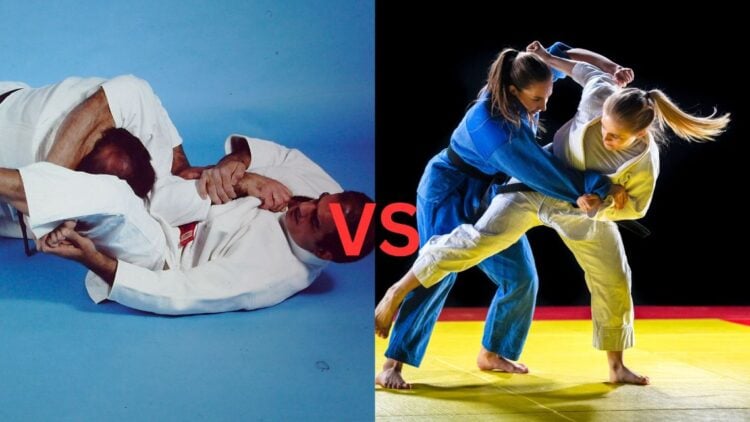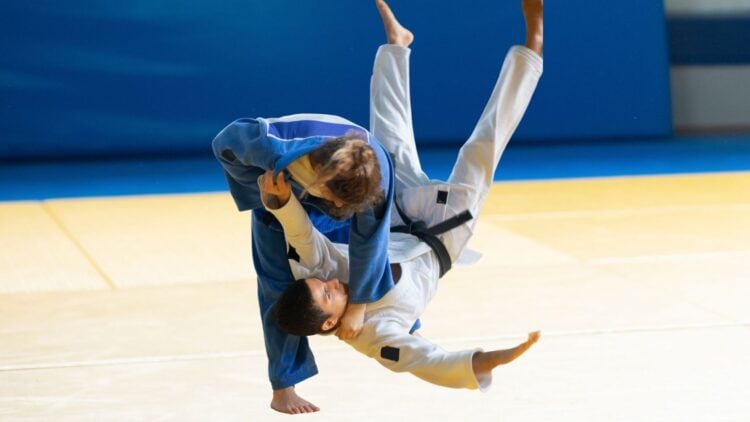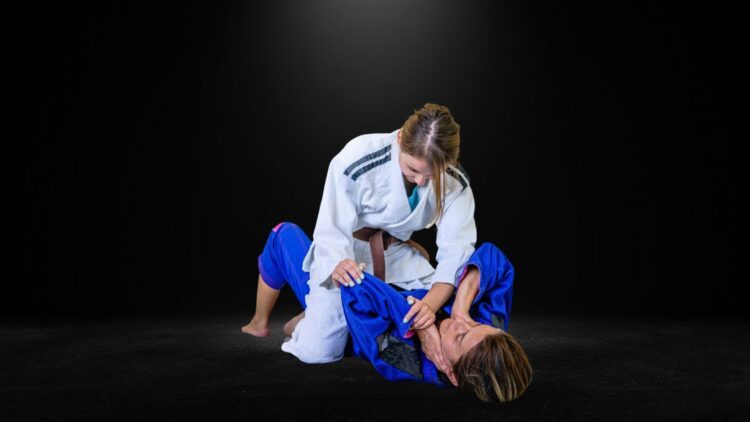
With judo being foundationally based on jujutsu, it should be no surprise that these two martial arts share many similarities. But as they are two separate sports, they have some differences too. In this article, we will compare jujutsu and judo so that you can have a better understanding of the two sports.
SIMILARITIES

Judo was originally created by a Japanese educator who was learning jujutsu to help combat the growing bullying crisis at his school. Motivated by a very philosophical approach to his training and the technique-obsessed focus of his instructor, Kanō Jigorō (the educator) realized that “jujutsu” would no longer be an appropriate name for what he was practicing.
Knowing that history, it’ll provide context for the similarities these two sports share today.
1) Both sports use the same equipment
Judokas (people who practice judo) and jujitsukas (people who practice jujutsu) both wear traditional Japanese robe-like uniforms called “gi”. Neither sport uses any equipment (for the most part) other than the body, and the two sports also use a common martial arts ranking system based on belt colors.
2) Both sports originated in Japan
As mentioned, judo and jujutsu are both Japanese sports. However, jujutsu is much older, with roots all the way back to the 14th century. On the other hand, judo was founded in 1882.
3) Both sports emphasize throws
While judo is focused solely on throwing an opponent to the ground, all forms of jujutsu also prioritize this, albeit with some strikes thrown in between takedowns.
4) Both sports have “forbidden” techniques
While judo has its own specific list of forbidden techniques with names to accompany them, freefighting jujutsu also prohibits many of the more dangerous maneuvers of the sport, such as scissor takedowns, neck locks, and various chokes.
DIFFERENCES
The main differences between judo and jujutsu are the different scoring systems, the objective, and their overall popularity. Let’s dive in!
SCORING/OBJECTIVE
JUDO

The objective in judo is mainly to powerfully throw the opponent to the ground on their back. A perfect throw, known as an “ippon”, immediately ends the match. A number of lower-quality throws, known as “waza-ari” and “yuko”, also score opponents’ points that can be the deciding factor if time expires during a match.
Alternatively, judokas can score points for holding an opponent’s upper body against the mat for an extended period of time, with a 20-second hold amounting to an ippon and ending the match.
JUJUTSU

The most popular jujutsu discipline is easily its “duo” competitions, which feature two teammates putting on a performative display of excellent jujutsu techniques in front of a panel of judges. This jujutsu event focuses more on the theatrics and techniques showcased in the routine than anything else.
In combat jujutsu, often called “freefighting” or just “jujutsu fighting”, the focus is somewhat similar to judo: bringing an opponent to the ground and forcing them into submission. Unlike judo, however, the submission wins the match, not necessarily a perfect throw.
POPULARITY
Possibly the most glaring difference between judo and jujutsu is the popularity disparity between the two sports. Even though jujutsu formed the foundation of judo and many other modern martial arts, it’s a widely unpracticed sport nowadays. While BJJ (Brazilian jujutsu) is enjoying a renaissance of sorts, Japanese jujutsu is not nearly as popular.
A possible explanation for this lack of modern popularity is that jujutsu is fundamentally focused on techniques intended to inflict significant pain, paralyze, or even kill an adversary. Although the sport can be practiced in ways that minimize these risks, the high-stakes nature of jujutsu might make it less alluring than a sport like judo, which was developed in times of peace as a recreational form of combat.
OVERALL COMPARISON
With judo stemming from the roots of jujutsu, there are rightfully many similarities shared between these two martial arts. In fact, there is almost nothing allowed in one of the sports that aren’t also allowed in the other. However, jujutsu tends to emphasize strikes and submissions a bit more, while judo is mainly centered around throwing techniques.
With that said, both sports are essentially polar opposites when it comes to competitive events. Not only is judo immensely more popular than its combat jujutsu equivalent, but most jujutsu competitions are also focused on the “friendly” and performative duo event, not one-on-one competitive matches like judo.
To tie it all together, although both sports are extremely similar, judo is widely considered a more practical and modernized version of jujutsu, a sport that has formed the foundation of many other modern martial arts.
- 30 GAMES TO PLAY OVER TEXT - April 22, 2024
- 20+ FREE PRINTABLE BABY SHOWER GAMES - April 16, 2024
- 20+ College Party Games for the Best Night Ever! - April 2, 2024